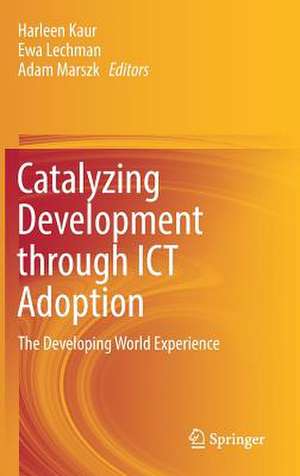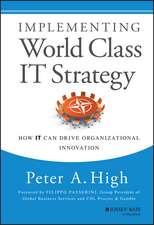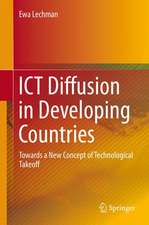Catalyzing Development through ICT Adoption: The Developing World Experience
Editat de Harleen Kaur, Ewa Lechman, Adam Marszken Limba Engleză Hardback – 12 iun 2017
| Toate formatele și edițiile | Preț | Express |
|---|---|---|
| Paperback (1) | 944.82 lei 6-8 săpt. | |
| Springer International Publishing – 12 aug 2018 | 944.82 lei 6-8 săpt. | |
| Hardback (1) | 950.84 lei 6-8 săpt. | |
| Springer International Publishing – 12 iun 2017 | 950.84 lei 6-8 săpt. |
Preț: 950.84 lei
Preț vechi: 1159.56 lei
-18% Nou
Puncte Express: 1426
Preț estimativ în valută:
182.00€ • 197.76$ • 152.98£
182.00€ • 197.76$ • 152.98£
Carte tipărită la comandă
Livrare economică 21 aprilie-05 mai
Preluare comenzi: 021 569.72.76
Specificații
ISBN-13: 9783319565224
ISBN-10: 3319565222
Pagini: 288
Ilustrații: XII, 288 p. 32 illus., 20 illus. in color.
Dimensiuni: 155 x 235 mm
Greutate: 0.6 kg
Ediția:1st ed. 2017
Editura: Springer International Publishing
Colecția Springer
Locul publicării:Cham, Switzerland
ISBN-10: 3319565222
Pagini: 288
Ilustrații: XII, 288 p. 32 illus., 20 illus. in color.
Dimensiuni: 155 x 235 mm
Greutate: 0.6 kg
Ediția:1st ed. 2017
Editura: Springer International Publishing
Colecția Springer
Locul publicării:Cham, Switzerland
Cuprins
Part I – General and Multi-regional Studies.- 1 Information and Communication Technologies for Economic Development. Identifying the channels of impact.- 2The impact of ICTs on women’s economic empowerment.- 3Big Data Analytics for ICT Monitoring and Development.- 4The role of ICT adoption in curbing corruption in developing countries.- 5Internet, educational disparities and economic growth: differences between low-middle and high-income countries.- Part II – Asia.- 6Strengthening the Public Sector Accounting through ICT The Experience of a Developing Country.- 7Potentials and Challenges of using ICT for Climate Change Adaptation: A Study of Vulnerable Community in Riverine Islands of Bangladesh.- Part III – Africa and Middle East.- 8Evaluation of E-Infrastructure Deployment in OECD and MENA Countries.- 9Model for Constructing Institutional Framework for Scientific Knowledge Management Systems: Nigerian Institutional Repository Innovation Case Applicable to Developing Countries.- 10Linkages between Formal Institutions, ICT Adoption, and Inclusive Human Development in Sub Saharan Africa.- Part IV – Latin America.- 11Inequalities in the appropriation of digital spaces in metropolitan areas of Latin America.- 12Internet Use and Public Programs Participation: Evidence from Chile.- 13E-commerce and Productivity: Evidence from Chile.- Part V – Europe.- 14Assessing the Economic Potential of Big Data Industries.- 15Is ICT the Solution of the Problem for Estonia?.
Recenzii
“This book has the ambitious undertaking of providing the reader with further evidence that ICT has encouraged growth and development by taking a look at its impact in different parts of the world. … The book, written mostly by academics, is interesting and has its uses especially for the policy-makers and ICT strategists that it is directing the results of the various studies toward.” (Cecilia G. Manrique, Computing Reviews, December, 2017)
Notă biografică
Harleen Kaur is a Senior Assistant Professor at the School of Engineering Sciences and Technology at Hamdard University, New Delhi, India. She recently worked as Research Fellow at United Nations University (UNU) in IIGH-International Centre for Excellence, Malaysia to conduct research on funded projects from South-East Asian Nations (SEAN). She is working on Indo-Poland bilateral international project funded from Ministry of Science and Technology, India and Ministry of polish, Poland. In addition, she is working on national project catalyzed and supported by National Council for Science and Technology Communication (NCSTC), Ministry of Science and Technology, India. Her key research areas include information analytics, applied machine learning and predictive modeling. She is the author of various publications and has author/ editor of several reputed books. She is a member to international bodies and is a member of editorial board of international journals on data analytics and machine learning. She is the recipient of Ambassador for Peace Award (UN Agency) and honors and is funded researcher by external groups.
Ewa Lechman is an Associated Professor of Economics at the Faculty of Management and Economics, Gdańsk University of Technology, Poland. Her extensive research interests concentrate on economic development, ICT, and its role in reshaping social and economic systems and various aspects of poverty and economics in developing countries. She coordinates and participates in international research and educational projects and also works as an independent expert assisting with innovation assignments, including the evaluation of small and medium enterprise proposals, EU-financed programmes, and policy design regarding innovativeness, digitalization, education and social exclusion. She was the 2013 winner of an Emerald Literati Network Award for Excellence and is a member of the editorial boardsof international journals on technology diffusion, the digital economy and economic development.
Adam Marszk is an Assistant Professor at the Faculty of Management and Economics, Gdansk University of Technology, Poland. He completed all exams in the Chartered Financial Analyst (CFA) Program ran by the CFA Institute. Author and reviewer of many publications in local and international journals focusing on following topics: financial innovations, linkages between financial markets and economy, financial systems in underdeveloped economies, economic integration, portfolio management. He is a coordinator and investigator in research projects financed by national and international institutions. He is a winner of the 2015 Jan Uphagen’s Award for the Best Young Scientists.
Textul de pe ultima copertă
This book examines the role that Information and Communication Technologies (ICTs) play in growth and economic development promotion, specifically for developing countries. It highlights multiple methodologies for quantifying the impact of ICTs. This includes quantitative and qualitative methods, but also novel, conclusive and informative methodological approaches for measuring ICTs influence on economic development. The book highlights trends, perspectives, and success stories for different developing countries. ICTs bring new business models, innovations, capital-labor substitution, improved goods and services to developing markets. Because they can spread rapidly, with little cost and require minimal skills for usage, ICTs create a solid background for social and economic gains. They enable significant reduction in information asymmetries, which improves access to economic activities for multitude of agents, fostering participation, inter alias in labor market of disadvantaged societal groups. After almost two decades of rapid diffusion of ICT in developing world, this book seeks to assess the real benefits and consequences of ICTs adoption in developing countries. The chapters use broad, real-world based evidence to provide a better understanding of the precise nature of new technologies and their impact of the country`s economy and society.
Caracteristici
Focuses on the role of ICTs in growth and economic development promotion in developing countries Highlights methodologies for quantification of the impact of ICT growth and development Includes country-specific “success stories” in ICT deployment for development Includes supplementary material: sn.pub/extras




















